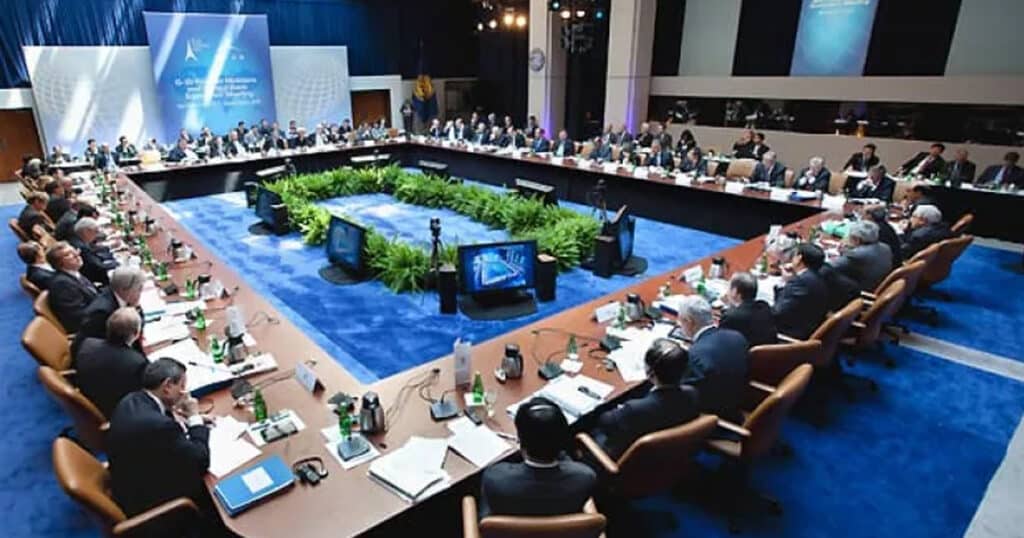
Congress Should Not Fund IMF Mission Creep
The Biden administration is seeking authority to support $21 billion in loans through a new International Monetary Fund trust to support climate change, health care, and other development activities outside of its remit. This mission creep is unwise, unnecessary, and not so coincidentally would create a path to circumvent statutory restrictions on the use of U.S. taxpayer dollars to support abortion oversees.
The IMF has a challenging, but straightforward, purpose: to promote international monetary cooperation, global trade, exchange stability, and support an international system of payments. To support these goals, the IMF was established to provide financial resources on a temporary basis to member states. Recently, the IMF leadership expanded the mission to include provision of long-term development finance to address climate change, pandemic preparedness, and other development purposes, through a mechanism called the Resilience and Sustainability Trust (RST). This should not be funded by Congress.
Although the IMF’s record is mixed, earning criticism from the left and the right, serious international financial crises over the past few decades have been used to justify its mission. Tapping international markets can be difficult or prohibitively expensive for developing countries in financial crisis, and the IMF can fill that gap, providing short-term financing to address an immediate challenge.
In return for this assistance, countries agree to adopt reforms and sound fiscal policies to mitigate the chances of a crisis down the road. However, these programs of reform and policy change are rarely completed, raising questions about the effectiveness of IMF interventions and whether, instead, they can foment dependency.
These failings are a reason to improve the IMF in fulfilling its mission. Instead, the IMF seems more interested in pursuing a new line of work to support a progressive globalist agenda.
In April 2022, the IMF Executive Board approved the establishment of the Resilience and Sustainability Trust. Unlike the short-term finance the IMF usually provides to bridge financial crisis, the RST would focus on “longer-term structural challenges – including climate change and pandemic preparedness – that entail significant macroeconomic risks and where policy solutions have a strong global public good nature.” About three-fourths of IMF members – over 140 countries – would be eligible to tap up to 150 percent of their overall IMF quota or $1 billion, whichever is lower, from the RST as 20-year loans at highly concessional rates, including a 10.5 year grace period.
In other words, the IMF is creating a mechanism to bribe three-quarters of the world’s governments into adopting left-of-center policies on climate and health. Even if a government disagrees with the purpose, the temptation of hundreds of millions in new highly subsidized IMF loans will be hard to resist.
In addition, this new trust turns IMF lending on its head. Traditionally, IMF loans are made to address already evident financial difficulties. The RST would be prospective – aimed at providing loans before a crisis exists intended to make countries more resilient. In other words, development loans.
IMF effectiveness will not be aided by expanding its mission to activities outside its expertise and experience. To the contrary, it will distract the attention of the IMF into non-core activities, undermining its already questionable impact and diverting resources away from its core purpose.
Moreover, they infringe on the mission and purposes of existing institutions like the World Bank. As explained by the World Bank, the two institutions were established to have distinct, but complimentary missions:
The World Bank Group works with developing countries to reduce poverty and increase shared prosperity, while the International Monetary Fund serves to stabilize the international monetary system and acts as a monitor of the world’s currencies.
It is unsurprising, therefore, that the proposal for the RST emphasizes close coordination with the World Bank for its experience and expertise in climate change, health systems, and other policy areas where the IMF has no experience. Why not just have the World Bank perform these functions? Because then the IMF would not become involved in this type of ideological development work.
The Biden administration strongly supports the RST and has sought authority for U.S. taxpayer funding sufficient to support $21 billion in RST loans. The Senate Committee on Appropriations included this authorization in the FY 2024 State, Foreign Operations, and Related Programs appropriations bill. The administration has also requested that it be included in a prospective short-term continuing resolution or emergency supplemental.
Why the urgency? The IMF currently has over $1 trillion in resources provided by member states. The $21 billion sought for the RST is relatively minor by comparison.
But it has a key feature of particular interest to the Biden administration: the funding would not be subject to the limitations and restrictions in the Foreign Assistance Act or State Department authorizing statutes, such as the Helms and Siljander Amendments, that prohibit use of U.S. assistance for abortion or lobbying on abortion. Thus, the RST is not only a new IMF venture into development, but also one where the Biden administration could support policies that U.S. development and health assistance currently cannot.
The initial stated purpose of the RST is to support national responses to climate change and pandemic response, but it is an easy step from pandemic response to providing health care more generally, including maternal health and family planning.
It is also worth asking whether China would be an outsized beneficiary of the RST as it has at other international financial institutions, like the Inter-American Development Bank where Beijing’s malign influence led Congress to introduce bipartisan legislation to address it. The IMF should not be exempt from similar scrutiny.
Congress should not abet IMF mission creep into areas it has no expertise, especially without checks on Chinese influence and without statutory assurances that U.S. taxpayer funds will not support abortion and other activities Congress has elsewhere prohibited. The House should reject authorization sought by the Biden administration and included in the Senate legislation to use U.S. taxpayer dollars to support $21 billion in RST loans.
Brett D. Schaefer is The Heritage Foundation’s Jay Kingham Senior Research Fellow in International Regulatory Affairs. Max Primorac is the director of Heritage’s Allison Center for Foreign Policy. Anthony Kim is the manager of global engagement in Heritage’s Thatcher Center for Freedom and editor of the think tank’s annual Index of Economic Freedom.
This article was originally published by RealClearWorld and made available via RealClearWire.



